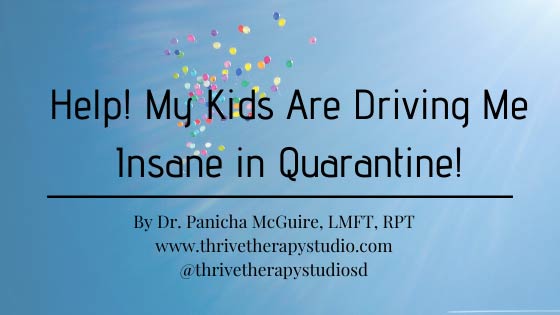Have you been feeling like your house has turned into a zoo? If so, then you are not alone! When the shelter-in-place order started, these are some things that my younger clients have told me:
- “I love coronavirus. I get to stay home. I don’t have school.”
- “I’m good! I don’t have math.”
- “I got to watch movies and play all day! It’s great!”
- “It’s like vacation and I’m with my family.”
And as expected, these statements did not last that long. Children don’t process loss or tragedy and adapt as quickly as adults do. In about two weeks after my clients made these statements, I started to get phone calls and emails from parents about their children “acting out” and having behavioral issues. It has started to sink in that the changes might not be so fun after all, and they are grieving their old lifestyle more than they knew. And before you know it, the confusion, uncertainty, and frustration (combined with cabin fever) start to hit them all at once. Although I can’t guarantee when things will get better for your child, there are ways that you can help support them and make staying at home more tolerable for everyone.
The first and most important rule of thumb is to be patient and be an active listener. Chances are, your child is not “acting out” on purpose. I’m a firm believer that there is always an underlying cause for a behavior. Often times, my clients have shared that they felt unheard or are angry about something in their lives. Acting out is just a way to externalize those feelings. Imagine if I had taken out half of the words in your vocabulary and you weren’t able to convey your thoughts to me. Your child’s behaviors are their way of conveying what’s going on inside. It may not be easy but patience can help your children feel that everything will be okay.
Staying active. Children who don’t get enough physical exercise during the day can often become restless when it is time to settle down. Anxiety, fear, and sadness can also show up as irritability in younger children. Keeping their heart rate up, and spending the extra energy will help ease their anxiety and (hopefully) help them feel tired when it is time for bed. Children are used to using both mental and physical energy 8 hours a day when they were going to school. Because this component is missing, try filling it with other ways to keep them engaged. Notice I didn’t say keep them entertained. I know there is a lot of stress out there for parents trying to keep their children happy now that they are home all day, but that does not have to be the case. This is about helping them spend excess mental and physical energy. And for parents who work from home, some of these activities can be done independently after showing them. Below are some ideas you can try:
Mentally challenging activities
- Starting a jigsaw puzzle
- Learning to knit/sew
- Learning an instrument (there are apps out there for this!)
- Scavenger hunt (can be done on a walk or in the home)
- Crafting (I’ve had clients stay engaged by making and donating masks to neighbors or hospitals)
- Commit to learning a new language for the whole family (maybe even practice holding a conversation in that language during dinner)
Physical activities
- Dancing (Just Dance 2020 on the Switch is super fun!)
- Walking or grooming your pet
- Jumping on the trampoline
- Relay races or obstacle courses in the home
- Twister
- The floor is lava (remember this one?)
- Musical chairs
- Virtual fitness classes for kids
Limit their exposure. This may seem strange for an article about behavioral issues in children; however, the current news coverage about COVID-19 has triggered a lot of fear response in children. Children are always listening and observing even when you think they aren’t. I’ve had young clients expressing their fears about getting sick, when things will open, how many cases are in San Diego and so much information that even I have not yet seen. Children can easily misinterpret what they hear and become frustrated about something they can’t understand. In turn, this can bring about more confused feelings that may already exist.
Lastly, staying connected to family and friends can help bring about some normalcy in their lives. Has your child facetimed their grandparents, aunts, or uncles lately? It may be helpful to reach out to other parents and set up virtual play dates. They might just show each other their toys or their room, but it is good to help them feel connected especially if they miss their friends. I’ve recently helped a client set up a Netflix Party with their friends so they can have a virtual slumber party (it was a hit!). This can be a real mood booster for some kids!
Remember that you, as a parent, are grieving too. It’s okay that you may feel short lately and found that you can’t have as much patience as you would like. Your children learn by example, so as long as you are trying and showing them that it is okay to pick yourself back up… that is an important life lesson on its own!
Reach out to start
your healing journey


